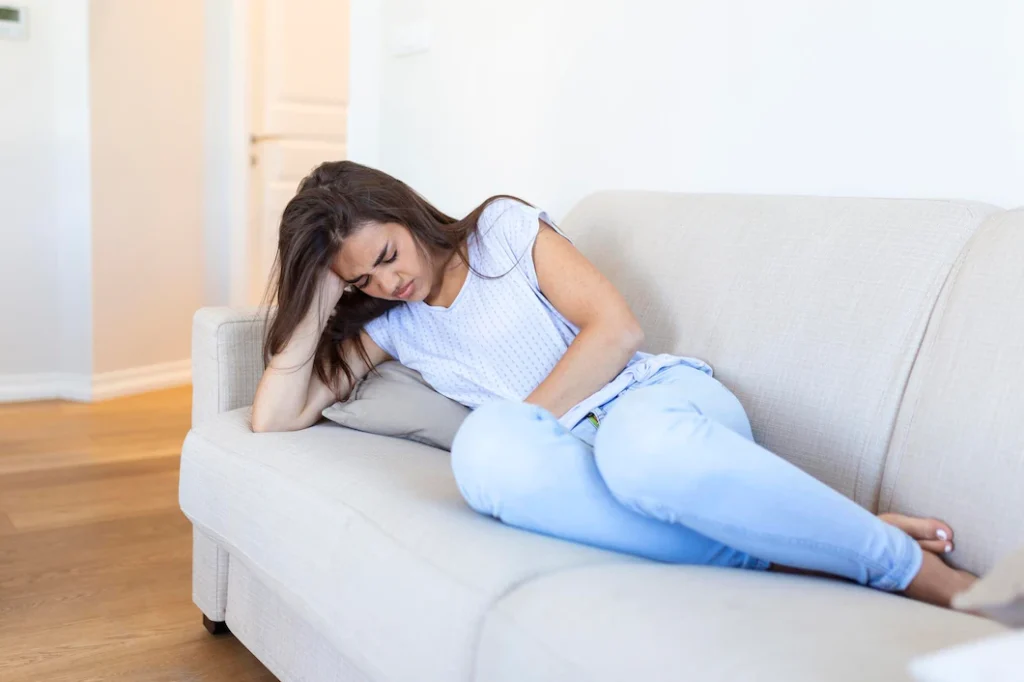Do you have period problems? Most women will experience period problems at some point in their life. The good news is that most of these problems can be treated successfully. This article will provide you with all the information you need to know about period problems.
If you are experiencing typical symptoms of period problems, it is essential to seek medical advice as soon as possible. Treatment for period problems can vary depending on the cause of the problem. However, several treatments are commonly used for these conditions.
Read our article to learn more about what causes period problems and how they can be treated!
What are Period Pains and What Causes Them?
What are Period Problems:

Every woman’s menstrual cycle is unique, and what may be considered ‘normal’ for one woman might not be the same for another.
However, when period problems become recurrent or severe, they can disrupt many areas of one’s life and cause stress-filled anxiety.
Excessively heavy bleeding, irregular cycles, or bleeding postcoital intercourse after sex are all potential signs of a more serious underlying issue. In such cases, it is strongly advised that you meet with your doctor or gynecologist to receive the proper guidance and treatment specific to your needs.
What Causes Period Problems

Abnormal menstrual cycles can have a variety of causes, and careful investigation by a gynecologist is required for an accurate diagnosis.
Stressful life events, weight fluctuations, dieting, alteration of exercise patterns, traveling, and illnesses can all be significant factors in disrupting the natural cycle.
Similarly, medications such as birth control pills that contain estrogen and progesterone hormones can contribute to period problems.
In some cases, benign non-cancerous growths known as uterine polyps or fibroids may also be involved.
It is important to keep track of your cycle pattern and contact a qualified healthcare provider should any abnormalities arise.
3 Common Types of Period Problems
1. Menorrhagia – Heavy Menstrual Bleeding

Menorrhagia is a condition in which women experience prolonged menstrual bleeding or hefty bleeding.
Signs that you may have Menorrhagia include needing to change your tampon or pad after only two hours or passing clots the size of a quarter or more significant.
If you experience these symptoms, you must see your gynecologist immediately so they can create a personalized treatment plan for you.
Left untreated, Menorrhagia can lead to significant blood loss and hurt your overall health, including anemia and other related issues.
Treatments such as dilation and curettage (D&C) or hysterectomy may be necessary depending on the severity of your condition. It is essential to take proactive steps to make sure this happens sooner rather than later for optimal health benefits.
2. Painful periods

Painful periods are standard and can affect women of all ages. This discomfort is caused by the uterine muscle contracting due to hormonal fluctuations, which help push out the blood during menstruation.
To alleviate the pain, exercise and over-the-counter medicines such as ibuprofen and aspirin have been found to be valuable treatments; however, those with asthma, kidney, or liver problems should not take these medicines.
Moreover, people under 16 years old should avoid taking aspirin. Whilst paracetamol may provide symptomatic relief from period pain, scientific research has indicated that it does not possess the same efficacy as ibuprofen or aspirin.
Another method that can reduce menstrual discomfort is the use of hormonal birth control; for example, contraceptives such as pills, IUSs, patches, or injections can all work to lessen period cramps and other associated discomfort.
3. Irregular periods

Irregular menstrual cycles are a normal part of many women’s lives and can be caused by hormone changes, body weight, or stress levels.
A period usually lasts between 2 to 7 days, with the average cycle taking around 5 days to complete. We assume this will happen every 28 days, although some women’s bodies may have slightly shorter or longer cycles – from 21 to 40 days – that is also perfectly ‘normal’.
When a woman’s cycle lies outside this regular pattern, meaning it falls significantly outside the 21–40-day range and blood flow varies from month to month, then we would say she has an irregular menstrual cycle.
This variation is often seen during puberty and perimenopause but can also be triggered by a change in contraception. Gynecologists advise monitoring your cycles over several months to determine if a genuine issue requires medical attention.



